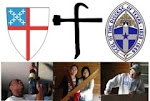
Texas Episcopal Disaster Relief and Development held the first training of Emergency Spiritual Care Teams on June 11-12.
The training, which is believed to be the first of its kind in the Episcopal Church, marked a significant step in The Episcopal Diocese of Texas' commitment to emergency preparedness and response.
Teams of spiritual care workers are now on call across The Episcopal Diocese of Texas. In the event of a disaster, these specially trained individuals will respond and offer spiritual care to those affected. The spiritual care teams are nicknamed “Cooler People” because they will be equipped with coolers in order to offer cold drinks to disaster survivors.
Episcopal Relief & Development sponsored the training held at Camp Allen, and they plan to use the training as pilot program for future endeavors across the country.
“The disaster response training was a milestone for Episcopal Relief & Development’s Disaster Preparedness Initiative,” said Katie Mears, manager of USA Disaster Preparedness and Response for Episcopal Relief and Development. “By holding the first regional response training, the Diocese of Texas has piloted for us how this process can work—from bringing together leaders to create a response plan, identifying local leaders to be trained and bringing together neighboring dioceses to share their experiences and learn together.”
Participants learned strategies and plans that will allow them to serve affected communities in the event of a disaster. Archdeacon Russ Oechsel and Rev. Gill Keyworth will act as the Diocesan Emergency Response Coordinators in the event of a deployment of the “Cooler People”.
“I can’t tell you how excited I am that we have this aspect of preparedness nailed down with a great beginning,” said Oechsel.
The training, which is believed to be the first of its kind in the Episcopal Church, marked a significant step in The Episcopal Diocese of Texas' commitment to emergency preparedness and response.
Teams of spiritual care workers are now on call across The Episcopal Diocese of Texas. In the event of a disaster, these specially trained individuals will respond and offer spiritual care to those affected. The spiritual care teams are nicknamed “Cooler People” because they will be equipped with coolers in order to offer cold drinks to disaster survivors.
Episcopal Relief & Development sponsored the training held at Camp Allen, and they plan to use the training as pilot program for future endeavors across the country.
“The disaster response training was a milestone for Episcopal Relief & Development’s Disaster Preparedness Initiative,” said Katie Mears, manager of USA Disaster Preparedness and Response for Episcopal Relief and Development. “By holding the first regional response training, the Diocese of Texas has piloted for us how this process can work—from bringing together leaders to create a response plan, identifying local leaders to be trained and bringing together neighboring dioceses to share their experiences and learn together.”
Participants learned strategies and plans that will allow them to serve affected communities in the event of a disaster. Archdeacon Russ Oechsel and Rev. Gill Keyworth will act as the Diocesan Emergency Response Coordinators in the event of a deployment of the “Cooler People”.
“I can’t tell you how excited I am that we have this aspect of preparedness nailed down with a great beginning,” said Oechsel.
The formation of the Emergency Spiritual Care Teams comes after months of planning among TEDRD’s board. Carolyn Gibbs, Preparedness and Planning Coordinator, organized the original training and Oechsel and Keyworth will direct the program.
“This training was essential to be truly prepared in the event of a disaster,” said Gibbs. “Of course, we hope we don’t have to deploy the ‘Cooler People’, but I’m glad that we are ready to respond.”
These “Cooler People” will help to support local parishes in their response to their community. By bringing in outside spiritual care assistance, local affected clergy and lay persons can focus on their parish and personal recovery without ignoring the larger community.
In addition to having new and stable repair and rebuild model with TEDRD, The Episcopal Diocese of Texas can now respond conscientiously to the spiritual needs of those affected by a disaster.
Representatives from Fort Worth, Louisiana, and Mississippi also attended the training with the intent of sharing the new spiritual care approach in their own diocese.
“I hope the skills the leaders learned at this training will enable the Episcopal Church in Texas, as well as in Louisiana, Mississippi, to serve their neighbors during this hurricane season,” said Mears.
Leaders in The Episcopal Diocese of Texas offered support from the inception of the “Cooler People” concept, and they were instrumental in the execution of the first training.
“Thanks to the direction and support of Bishop Doyle, the management and service of our deacons, and the dedication of our coordinators, and ERD, we now have trained Spiritual Care teams and a plan for deployment,” said TEDRD board member, Rev. Lillian Hyde. “I am more than pleased. Many thanks to everyone who made it possible.”



No comments:
Post a Comment